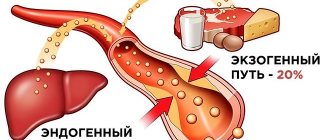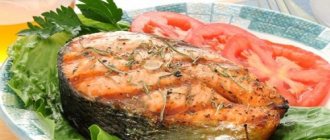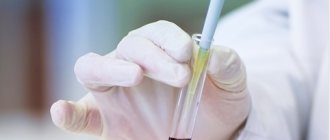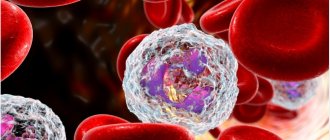HDL (high-density lipoprotein, HDL) is often referred to as “good” cholesterol because it helps remove “bad” cholesterol from the body and is essential for many vital processes in our body. Research has proven that lowering LDL (low-density lipoprotein, LDL) cholesterol levels reduces the risk of developing cardiovascular disease. Read on to find out how you can naturally increase your HDL cholesterol levels.
What is HDL cholesterol
High-density lipoproteins (HDL) are one of the classes of lipoproteins in blood plasma. They are capable of transporting fat molecules (lipids) throughout the body. HDL is often called “good” cholesterol because it helps break down another class of lipoprotein, LDL (low-density lipoprotein), which contributes to heart disease.
HDL differs from LDL in its higher density because it contains a higher percentage of protein and lipids.
HDL takes up excess free cholesterol in the blood and transports it to the liver
HDL also plays an essential role in reducing oxidation and inflammation , improving the functioning of body cells and the immune system, improving insulin sensitivity, and may protect us from the development of neurodegenerative diseases. []
HDL cholesterol is synthesized in the liver and passes from the small intestine into the blood, where it quickly picks up particles of excess cholesterol and returns it back to the liver to reduce cholesterol in the blood. This is why adequate and healthy amounts of HDL are associated with a reduced risk of disease due to high cholesterol levels.
The Harm of “Bad” LDL Cholesterol Depends on Particle Size
Causes of Low Cholesterol
There are people who lead active lifestyles, but their HDL levels remain low or unchanged. Why is that? Below is a list of likely causes that may affect HDL.
Genetics
Genetics determines almost everything in the human body, so you shouldn’t discount it. If a person has a genetic predisposition to insufficient levels of good cholesterol, then the risk of developing cardiovascular diseases increases significantly. The most unpleasant thing about this situation is that this process cannot be controlled. That is why it is extremely important to eat right for those people who tend to increase the level of bad cholesterol.
Lack of training
How often did your doctor advise you to exercise? Training is an important part of any person's life. It doesn't matter what shape a person is in, because you need to train every day. Exercising has many health benefits. They increase HDL cholesterol levels. Just 3 workouts a week for 45 minutes can improve lipid levels in the blood.
3. Insufficient omega-3 fatty acids in the body
A balanced diet is very important. It consists not only of eliminating sweet and fried foods, but also of regularly consuming the required amount of vitamins, proteins and omega-3 fatty acids. Omega-3 fats are essential for the normal functioning of the body. They come in two types: docosahexanoic acid and elcosapentanoic acid. If these fatty acids are lacking in the diet, HDL cholesterol levels are likely to be reduced.
Insufficient amount of plant foods in the diet
The final cause of low good cholesterol is a lack of plant-based foods in the daily menu. There are fruits that can solve this problem. They are usually colored red or purple. These fruits are rich in resveratrol, which is a powerful antioxidant that enhances regeneration at the cellular level. It is found in red grapes, cherries, apples and berries.
Types of lipids
HDL is just one class of lipids, or fatty molecules, that are found in our blood. Other lipids circulating in the blood include low-density lipoproteins (LDL), very low-density lipoproteins (VLDL), and triglycerides.
LDL transports cholesterol throughout the body, while HDL binds excess unused cholesterol and returns it back to the liver for disposal. VLDL is formed in the liver and, entering the blood, is converted there into LDL.
Triglycerides are the main type of fat in the body and high levels are linked to a variety of diseases, such as heart disease and diabetes.
Our diet can affect the changes in LDL levels and removal from the body, and the amount of triglycerides can affect VLDL levels.
The structure of HDL (HDL) and LDL (LDL) lipoproteins
HDL cholesterol test
The recommended healthy level of HDL in the blood is at least 0.8 mmol/liter for men and at least 0.88 mmol/liter for women .
Research has determined that elevated levels of cholesterol in the blood contribute to the development of cardiovascular disease, so lowering the amount of HDL (“good” cholesterol) does not completely remove free cholesterol from the blood and also contributes to the risk of disease. Low HDL levels may also contribute to the development of inflammation and metabolic syndrome , particularly type 2 diabetes []
For certain diseases such as diabetes and sickle cell disease
, high-density lipoprotein (HDL) levels may become abnormal and contribute to the development of general inflammation. In these cases, very high HDL levels may be harmful rather than beneficial. []
A study of 767 non-diabetic patients who had recently had a heart attack found that those with very high HDL levels also had high levels of C-reactive protein , which did not help but increased the risk of heart disease. []
The most effective foods for lowering bad cholesterol
LDL cholesterol in excess leads to blocked arteries, which is ultimately the cause of heart attacks, strokes and various arterial diseases such as arteriosclerosis, for example. Here are a few foods that will help lower bad cholesterol naturally.
Oatmeal, bran and high fiber foods
Oatmeal contains soluble fiber, known for its ability to lower bad cholesterol. Only 5-10 grams of soluble fiber food per day is recommended to lower cholesterol. 1.5 cups of oatmeal per day can meet this body's need for soluble fiber.
Fish and omega-3 fatty acids
It is known that consuming fish with omega-3 fatty acids can help solve the problem of high cholesterol. The following types of fish contain the highest amounts of omega-3 fatty acids:
- River trout;
- Mackerel;
- Herring;
- Salmon;
- Sardines;
- Halibut.
Other sources of omega-3 fatty acids include canola and ground flax seeds.
Olive oil
Olive oil is rich in antioxidants that lower bad cholesterol.
Natural olive oil contains more nutrients and antioxidants. Remember that the lighter the oil, the more processing it has undergone.
4. Products enriched with stanol or sterol
Store shelves are full of products fortified with stanol or sterol (plant chemicals). These substances interfere with the absorption of cholesterol.
Fruit juices, yogurts and some other foods contain sterols, which can reduce cholesterol levels in the body by 10%.
What reduces HDL levels
There are genetic reasons for reducing HDL, but it is worth paying attention to the possibilities that can be controlled and bring HDL to a healthy norm.
Consumption of artificial trans fats
Artificial trans fats, found in margarine and many processed foods, are inflammatory and harmful to our health.
A study of 27 young women found that consuming partially hydrogenated soybean oil resulted in a 10% reduction in HDL levels compared to consuming palm oil. []
A study of 40 healthy adult women compared the effects of consuming trans fatty acids from natural sources with the effects of consuming industrial fats. The result of this comparison was the conclusion that industrially produced trans fats contributed to a decrease in the amount of HDL in the blood. []
Smoking
Cigarette smoking has undoubtedly been shown to be a significant factor in increasing the risk of heart disease. Smoking cigarettes reduces high-density lipoprotein (HDL) levels, and cigarette smoke itself can directly damage the HDL molecule, making it impossible for the molecule to protect the heart and blood vessels from cholesterol and inflammation. []
Diseases
Several health disorders that fall under the category of metabolic syndromes are associated with low levels of HDL in the blood. These disorders include type 2 diabetes , insulin resistance , central obesity (excess belly fat), high blood pressure and high triglycerides . []
In addition, most autoimmune diseases: rheumatoid arthritis , lupus, psoriasis, as well as periodontal disease and any infectious diseases reduce HDL levels. []
Ways to Increase HDL Cholesterol
Olive oil in nutrition
Saturated fats, found in dairy products and fatty meats, increase LDL and HDL levels in the blood. Replacing these saturated fats with “healthy fats” (polyunsaturated or monounsaturated fats from nuts, seeds, avocados, vegetable oils) has been shown in studies to help lower LDL levels. []
Numerous studies have also shown that supplementing your diet with olive oil can help lower total cholesterol and increase high-density lipoprotein (HDL) levels. Olive oil contains antioxidants called polyphenols, which are responsible for its protective properties for the cardiovascular system. []
Olive oil also improves cholesterol profiles by improving the ability of HDL to properly interact with cholesterol. A study of 26 healthy volunteers suggests that olive oil ( 25 ml/day or 2 tablespoons ) improves cholesterol levels by increasing the production of ABCA1 and ABCG1 proteins, which are essential for the transport of fats across cell membranes. []
Olive oil also helps enhance the anti-inflammatory properties of HDL. Another study of 20 healthy adults found that drinking 25 ml of extra virgin olive oil per day for 12 weeks increased the amount of protein associated with HDL (paraoxonase 1), which helps HDL exert its anti-inflammatory properties. []
Eggs in the diet
A small study of 28 obese people found that a low-carbohydrate diet supplemented with 3 eggs per day increased high-density lipoprotein (HDL) levels by 25%. Including eggs in the diet helped reduce the risk of developing metabolic syndrome. And this effect was more pronounced in obese people. []
In another study of 15 obese people, 3 chicken eggs a day also increased HDL (“good” cholesterol) levels by 52%. However, this second study was sponsored by the American Chicken Egg Association. []
Another study involving 42 elderly men and women demonstrated that 3 chicken eggs per day increased HDL cholesterol by 23%. []
And a study of older adults taking statins and eating 4 eggs a day concluded that these people experienced a 5% increase in HDL levels over 5 weeks without an increase in LDL (“bad” cholesterol). []
Low Carb Diet
Reducing carbohydrates in the diet
Numerous studies demonstrate that reducing carbohydrates and increasing healthy fats in your diet can provide many health benefits, including lower blood sugar , weight loss , and improved insulin sensitivity . Another big benefit of this diet is the increase in high-density lipoprotein (HDL). []
In a randomized controlled trial of 115 obese adults with type 2 diabetes consuming less than 50 g. carbohydrates per day, as a result of weight loss, there was an increase in HDL cholesterol levels almost 2 times higher than in those people who did not switch to such a diet. []
Overweight people with diabetes (a total of 194 people) followed Mediterranean diet for 12 months in a randomized trial. At the end of these 12 months, these people had an increase in HDL in their blood, which did not occur in those subjects who simply followed a Mediterranean diet without reducing the amount of carbohydrates. []
In a prospective study, 22 obese adults with metabolic syndrome followed a “Spanish Mediterranean ketogenic diet” for 12 weeks. The long-term result of this diet was an increase in HDL levels in their blood, as well as the fact that their metabolic syndrome was completely cured . []
Another cohort study followed 64 obese adults for 56 weeks while on a ketogenic diet . The result of this experiment was an increase in HDL levels and a decrease in total cholesterol levels along with a decrease in HDL (“bad” cholesterol). []
Fruits and vegetables containing anthocyanins
Fruits and vegetables with anthocyanins
Blueberries , blackberries, pomegranate, eggplant, red cabbage and other purple fruits and vegetables that are high in anthocyanins, which are powerful antioxidants, may help increase HDL cholesterol. []
In one experiment, 58 adults with diabetes were given 160 mg of anthocyanin concentrate twice daily for 24 weeks, which resulted in a 20% increase in HDL cholesterol. []
Another study of 120 patients with high cholesterol showed a nearly 14% increase in HDL cholesterol after 12 weeks of anthocyanin supplementation (160 mg, twice daily). []
Exercise stress
Exercise increases HDL in the blood through multiple pathways, and recent research suggests that any amount of physical activity can be beneficial, and its effects accumulate over time . []
A study involving 18 obese men and women for 12 weeks examined the effects of regular endurance training on HDL levels. As a result of the experiment, an increase in HDL in men and a favorable shift in HDL fractions in women was recorded. The important thing is that no diets were followed. []
The result of regular physical activity for 12 months: an increase in HDL and a decrease in LDL along with total cholesterol.
Another study (prospective observation) of 200 men found that an increase in HDL occurred with regular endurance training. However, the most significant positive changes occurred in patients who had high levels of harmful triglycerides in the blood and had a large amount of fat in the abdominal cavity (abdominal obesity). []
Weight loss
Many studies have shown that weight loss (losing weight), regardless of the diet used, necessarily increases the level of HDL (“good” cholesterol). A study of 3,480 Japanese adults showed that losing 3 kg of weight resulted in an average increase in high-density lipoprotein (HDL) levels of 4 mg/dL. []
Reducing alcohol consumption
The association between alcohol consumption (1 drink per day for women and 1-2 drinks per day for men) and a reduced risk of cardiovascular disease has been observed in many studies. However, increasing the amount of alcohol consumed above these designated values not only leads to a sharp increase in the risk of heart disease, but also stimulates the risk of developing many other diseases, such as diabetes or stroke. []
A study of 2,473 men and 1,530 women found that moderate (no more than 1-2 drinks per day, where the drink is 200 ml of wine or beer, but not spirits) alcohol consumption showed higher levels of HDL cholesterol. []
Adding coconut oil
Several studies have found that consuming edible coconut oil (usually about 2 tablespoons per day) can raise HDL levels more than other types of fat. Coconut oil also helps lower the LDL to HDL ratio, which can reduce the risk of heart disease. []
Oily fish in the diet
There are conflicting reports about the effect of consuming oily fish or fish oil supplements on HDL cholesterol levels. Some studies have noted an increase in HDL when participants consumed large amounts of fish, but the effects were minimal, and other studies have found an increase in HDL in response to increasing the amount of fish in the diet or taking supplements. []
Medicines
Note : When writing this section, we do not recommend these medications for use. We are simply providing information that is available in the scientific literature. Please discuss your medications with your doctor.
Statins
Statins can lower LDL cholesterol and increase HDL cholesterol. However, whether this actually has a significant impact on the risk of developing cardiovascular disease is still unclear. A meta-analysis of 12 large studies, including more than 26,000 patients, found that changing blood cholesterol levels with drugs has no beneficial effects, as people do not reduce their risk and remain at high risk of heart disease. []
Statins increase the risks of diabetes and insulin resistance (https://diabetes.diabetesjournals.org/content/63/11/3569)
Fibrates (alpha-agonists) or thiazolidinions
Fibrates and thiazolidinediones are two classes of compounds that activate the PPARα protein, which helps increase fat breakdown in the liver and other parts of the body. These drugs are sometimes used by patients who cannot tolerate statins and require an increase in HDL and a decrease in LDL.
Paradoxically, in some people and in rare cases, these drugs can cause a sharp decrease in HDL (“good” cholesterol). Therefore, it is very important to take fibrates and thiazolidinediones under the guidance of a doctor. []
Preventive actions
As you can see, the treatment of this disease is quite a difficult, long and dangerous process. Medicines that really help can cause harm due to a large number of side effects. Therefore, you should be very careful and responsible about your health.
If you are examined on time and take the necessary tests, then you will not need long-term treatment. Be sure to reconsider your diet, because there are foods that help increase cholesterol, but at the same time, there are also those that lower it. Sufficient physical activity is required.
Some foods may help lower cholesterol
Many people think about a healthy lifestyle and proper nutrition, which is absolutely not in vain. After all, in the assortment of products that are found on the shelves, there are those that do nothing but harm. If we talk about cholesterol and its norm, which should not be exceeded, then the following foods should be excluded:
- chips;
- salted crackers;
- smoked meats;
- sausage;
- mayonnaise;
- ketchup;
- margarine;
- spread;
- alcohol;
- sparkling sweet water;
- sweet pastries;
- fatty food.
It is very important that the menu includes different foods that will saturate the body with vitamins. The following products are useful:
- carrot;
- tomatoes;
- garlic;
- pumpkin;
- cucumbers;
- zucchini;
- seafood.
Few people know, but ordinary raspberries, viburnum, and black rowan help lower cholesterol. In addition, rose hips, which have a lot of positive properties, cope well with this.
It is necessary to move enough and load yourself with physical activity. This does not necessarily mean playing sports in the gym; morning exercises and exercises before bed are enough.
Health Dangers of Low HDL Cholesterol
The biggest risk of low high-density lipoprotein (HDL) levels is the development of cardiovascular disease. There is a large body of evidence that demonstrates the protective effect of HDL: approximately 30% of patients with heart disease have normal total blood cholesterol levels, but only reduced HDL levels highlight the important role this molecule plays in protecting the heart. []
HDL (“good” cholesterol) also plays an important role in the functioning of the immune system. A large prospective population-based study of 20,000 adults found that people with very low HDL levels had a 75% increased risk of infectious disease . Interestingly, very high levels of HDL can also be problematic: those people who had very high levels of high-density lipoprotein (HDL) had a 43% increased risk of infectious diseases, compared with people with “normal” levels. []
Additional Information
The main problem in interpreting the results of studies on HDL is that it is difficult to determine how much of a role other factors play. For example, if there is an association between young men who eat a low-fat diet and also have high HDL cholesterol, it is also possible that the same men do not smoke and exercise regularly. Additionally, many of these studies are self-report and participants do not always answer truthfully. []
It is generally assumed that increasing dietary cholesterol intake will also increase blood cholesterol levels and, over time, lead to heart disease. While this is partially true, it is important to note that only 25% of blood cholesterol comes from food. The remaining 75% of cholesterol in the blood is synthesized by the body, and this is largely controlled by genetics. []
The information on this site has not been evaluated by any medical organization. We do not seek to diagnose or treat any disease. The information on the site is provided for educational purposes only. You should consult your physician before acting on information from this site, especially if you are pregnant, nursing, taking medications, or have any medical condition.
Rate this article
Average 4.7 Total votes (20)
Some useful tips
If your HDL is too low, there are several other steps you can take to reduce your chances of heart disease and heart attack.
Train every day
working out is a great way to get your body working! It burns a huge amount of calories and keeps a person in shape. Perform 30 to 60 minutes of aerobic exercise every day to improve your HDL cholesterol levels and improve your health.
Stop smoking
In order to increase the level of good cholesterol in the body, you need to reduce the number of cigarettes you smoke per day. Therefore, quit smoking and changes will not take long to appear.
Lead a healthy lifestyle
Maintaining a normal weight and a healthy lifestyle can help improve HDL cholesterol levels. Obesity is always associated with increased levels of bad cholesterol and the risk of developing cardiovascular diseases, as well as metabolic disorders.
Try taking special medications
Medicines can also raise HDL cholesterol. Niacin is one of them. It is very effective and inexpensive. This drug is a potent one, so consult your doctor before using it.
5. Don’t eat fast food, convenience foods, or processed foods.
These foods contain large amounts of trans fats, which are the main cause of high levels of bad cholesterol.
Eat less sweets
Sweets increase blood sugar levels, as well as bad cholesterol. Eat better foods that contain natural sugars, namely berries, fruits, dark chocolate.











